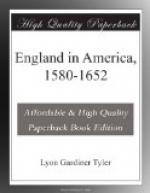[Footnote 39: A Description of the Province of New Albion (1648) (Force, Tracts, II., No. vii.).]
[Footnote 40: Brown, Genesis of the United States, I., 438.]
[Footnote 41: Hamor, True Discourse, 17; Breife Declaration.]
[Footnote 42: Brown, Genesis of the United States, II., 739, 740.]
[Footnote 43: Ibid., 657.]
[Footnote 44: Ibid., 760, 761.]
[Footnote 45: John Rolfe, Relation, in Va. Historical Register, I., 110.]
[Footnote 46: Virginia Company, Proceedings (Va. Hist. Soc., Collections, new series, VII.), I., 65.]
[Footnote 47: Neill, Virginia Company, 98.]
[Footnote 48: Smith, Works (Arber’s ed.), 533.]
[Footnote 49: Rolfe, Relation, in Va. Historical Register, I., 108.]
[Footnote 50: Breife Declaration.]
[Illustration: CHART OF VIRGINIA SHOWING INDIAN AND EARLY ENGLISH SETTLEMENTS IN 1632]
CHAPTER V
TRANSITION OF VIRGINIA
(1617-1640)
During the period of Dale’s administration the constitution of the London Company underwent a change, because the stockholders grew restless under the powers of the treasurer and council and applied for a third charter, limiting all important business to a quarterly meeting of the whole body.
As they made the inclusion of the Bermuda Islands the ostensible object, the king without difficulty signed the paper, March 12, 1612; and thus the company at last became a self-governing body.[1] On the question of governing the colony it soon divided, however, into the court party, in favor of continuing martial law, at the head of which was Sir Robert Rich, afterwards earl of Warwick; and the “country,” or “patriot party,” in favor of ending the system of servitude. The latter party was led by Sir Thomas Smith, who had been treasurer ever since 1607, Sir Edwin Sandys, the earl of Southampton, Sir John Danvers, and John and Nicholas Ferrar.[2] Of the two, the country party was more numerous, and when the joint stock partnership expired, November 30, 1616, they appointed Captain Samuel Argall, a kinsman of Treasurer Smith, to be deputy governor of Virginia, with instructions to give every settler his own private dividend of fifty acres and to permit him to visit in England if he chose.[3]
Argall sailed to Virginia about the first part of April, 1617, taking with him Pocahontas’s husband, John Rolfe, as secretary of state. Pocahontas was to go with him, but she sickened and died, and was buried at Gravesend March 21, 1617. She left one son named Thomas, who afterwards resided in Virginia, where he has many descendants at this day.[4] Argall, though in a subordinate capacity he had been very useful to the settlers, proved wholly unscrupulous




